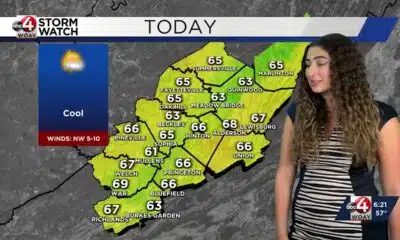News from the South - Texas News Feed
Junk science law changes pass Texas House
“Proposal to enhance Texas’ pioneering junk science law approved by Texas House” was first published by The Texas Tribune, a nonprofit, nonpartisan media organization that informs Texans — and engages with them — about public policy, politics, government and statewide issues.
Sign up for The Brief, The Texas Tribune’s daily newsletter that keeps readers up to speed on the most essential Texas news.
Over a decade ago, the Texas Legislature passed a groundbreaking law to provide justice when the scientific evidence for a criminal conviction has changed or been discredited.
But in a report examining appeals ruled upon in the decade since, the Texas Defender Service found last year that the so-called junk science law “is not operating as the Texas Legislature intended,” and that the courts were applying a burden of proof that made it nearly impossible for appellants to meet. For some lawmakers, Texas death row inmate Robert Roberson became the face of that failure.
On Thursday, the Texas House sought to rectify those shortcomings. Lawmakers approved, 124 to 14, House Bill 115 — legislation that would codify a number of recommendations advocates made to ensure the junk science law is working as intended.
“I do want to stress that this is a critical bill, and would appreciate your favorable consideration,” Rep. David Cook, R-Mansfield and author of the bill, said during a late-night committee hearing last month.
The measure, which must pass another vote in the House as a formality, does not have a companion in the Senate, making its path to law unclear.
The proposal emerged out of a contentious interim period of the Legislature last year, during which the House Criminal Jurisprudence Committee confronted Roberson’s case. The argument for Roberson’s innocence became a political lightning rod, as committee members took extraordinary steps to delay his October execution while Gov. Greg Abbott and Attorney General Ken Paxton pushed back and stood behind the conviction.
Roberson was convicted of capital murder in 2003 for the death of his 2-year-old daughter Nikki, who was diagnosed with shaken baby syndrome. He was one of the first death row inmates to have his conviction set for further review under the junk science law in 2016, when the Court of Criminal Appeals directed a lower court to take a second look at his case.
But in 2023, after the state argued that the science had not changed that much and a trial court agreed, the Court of Criminal Appeals upheld Roberson’s conviction and set an Oct. 17, 2024 execution date.
Lawmakers, concerned that the courts had not meaningfully engaged with the evidence and properly applied the junk science law, managed to force a stay of execution in October. Roberson’s execution date has not yet been reset, and he has a pending appeal.
Still, proponents of HB 115 said the bill was meant to address broader deficiencies in the law — regardless of its application to Roberson’s case. If passed, its provisions would not go into effect until December 1.
The junk science law — Article 11.073 in Texas’ criminal code — meant to provide a way for convicted people to obtain new trials if they can show that the underlying scientific evidence in their conviction was flawed. Lawmakers overwhelmingly approved the bill in 2013 after two failed attempts to do so.
“It stood as a commitment to Texans that science in our criminal trials was not just a sword of the state, but also a shield for the wrongfully convicted and the unfairly prosecuted,” Chase Baumgartner, an attorney at the Innocence Project of Texas, testified to the House Criminal Jurisprudence Committee last month. “House Bill 115 reaffirms that commitment and shores up where our current law has fallen short.”
The measure would address many of the interim committee’s concerns with the law. It would entitle low-income defendants to an attorney in junk science appeals and require the state’s highest criminal court to issue a written opinion when denying a junk science appeal.
It would also allow the court to consider junk science appeals even if they do not meet certain procedural requirements, a provision meant to address a finding that the Court of Criminal Appeals rejected almost 40% of petitions on procedural grounds, without considering the merits of the claims.
It would also clarify that the junk science law requires appellants simply to show that their conviction was based on discredited science — not to prove their innocence. The bill changes the standard of proof to a “reasonable likelihood” that the evidence “could have affected” a person’s conviction or sentence.
That is a lower bar for convicted people to clear than the law’s current standard, which says that “on the preponderance of evidence,” the defendant “would not have been convicted” based on the debunked science. Critics said that that was virtually the same standard required to prove “actual innocence” — a difficult case to make, especially for people behind bars.
“The current standard has been interpreted by the Court of Criminal Appeals to essentially require the elimination of any rational basis for the conviction, which is the legal actual innocence standard,” Burke Butler, executive director of the Texas Defender Service, told the committee last month. “This is not at all what legislators intended when they originally passed the law, and for various reasons, that standard is actually impossible for most innocent people to meet.”
And the bill would extend the junk science law to accept relevant evidence that was “not reasonably available” to the defendant at trial, and that “tends to negate” scientific evidence “relied on by the state” at trial.
In its report, the Texas Defender Services found that no one on death row has successfully used the junk science law to obtain a new trial. The report also found that the Court of Criminal Appeals had applied a higher standard of proof than required by the law, rejected a significant portion of appeals on procedural grounds and produced a “pervasive lack” of written opinions explaining its rationale, Butler said.
“No innocent person should ever serve out a prison sentence without having their case considered on the merits,” she said. “The fixes in HB 115 would ensure that innocent people convicted based on junk science have a genuine pathway for relief.”
First round of TribFest speakers announced! Pulitzer Prize-winning columnist Maureen Dowd; U.S. Rep. Tony Gonzales, R-San Antonio; Fort Worth Mayor Mattie Parker; U.S. Sen. Adam Schiff, D-California; and U.S. Rep. Jasmine Crockett, D-Dallas are taking the stage Nov. 13–15 in Austin. Get your tickets today!
This article originally appeared in The Texas Tribune at https://www.texastribune.org/2025/05/14/texas-junk-science-bill-house-david-cook/.
The Texas Tribune is a member-supported, nonpartisan newsroom informing and engaging Texans on state politics and policy. Learn more at texastribune.org.
The post Junk science law changes pass Texas House appeared first on feeds.texastribune.org
Note: The following A.I. based commentary is not part of the original article, reproduced above, but is offered in the hopes that it will promote greater media literacy and critical thinking, by making any potential bias more visible to the reader –Staff Editor.
Political Bias Rating: Center-Left
This content presents a balanced yet slightly progressive perspective focused on criminal justice reform, specifically addressing the shortcomings of Texas’ junk science law. It highlights concerns raised by advocacy groups and lawmakers about protecting the wrongfully convicted and ensuring fair judicial processes, which are issues more commonly emphasized by center-left viewpoints. The tone is factual and respectful of different political actors, including Republicans and Democrats, indicating an attempt to present the topic without strong partisan bashing, but the focus on reform and protections for defendants leans the coverage just left of center.
News from the South - Texas News Feed
It's a love story: Taylor Swift, Travis Kelce announce engagement
SUMMARY: Taylor Swift and Kansas City Chiefs tight end Travis Kelce are engaged, announcing it on Instagram with a photo of Kelce proposing in a garden and showcasing Swift’s dazzling “Old Mine brilliant cut” ring. The couple, both 35, began dating in 2023 after Kelce attended Swift’s Eras Tour. Despite early challenges, including Kelce’s unsuccessful attempt to give Swift a friendship bracelet with his number, their relationship blossomed. Swift has supported Kelce at numerous games, including two Super Bowls, while Kelce frequently attends her concerts. Their relationship has garnered massive media attention and was featured in ESPN’s documentary “The Kingdom.” Kelce’s parents praise their bond as genuine and deserving.
The post It's a love story: Taylor Swift, Travis Kelce announce engagement appeared first on www.kxan.com
News from the South - Texas News Feed
We're excited for National Dog Day!
SUMMARY: To celebrate National Dog Day, the studio welcomed three dogs: Mac, Sandy, and Leo. Sandy sports a playful lipstick kiss from Kim Castro, while lively one-year-old Leo kept everyone entertained. The dogs’ owners, also producers, shared that it’s usually breakfast, walk, or nap time for them. The studio enjoyed the furry therapy vibe and encouraged viewers to treat their dogs with special offers from PetSmart (buy one, get one 25% off on treats), Lazy Dog Restaurant and Bar (coupon with dog bowl and entree), and free Puppuccinos from Starbucks. Viewer-submitted dog photos added to the joyful celebration of our furry friends.
We had in-studio guests to help us celebrate.
News from the South - Texas News Feed
'Bathroom bill' advances in Texas House days after tensions flared at hearing
SUMMARY: A Texas House panel approved Senate Bill 8, limiting transgender people’s use of bathrooms in government buildings, marking the first House advancement of a “bathroom bill” in over eight years. The bill, backed by Gov. Greg Abbott, passed 9-3 in committee and now heads to the House floor. SB 8 imposes penalties on institutions allowing restroom use not matching sex assigned at birth and extends restrictions to schools, universities, shelters, prisons, and jails. Opponents warn it promotes harassment and violence, while supporters cite protection of women and children. The bill includes measures to shield it from legal challenges. Lawmakers must pass bills by Sept. 13.
The post 'Bathroom bill' advances in Texas House days after tensions flared at hearing appeared first on www.kxan.com
-
News from the South - Kentucky News Feed6 days ago
First of its kind clinical trial offers new hope for Kentuckians at risk of dementia
-
News from the South - Arkansas News Feed6 days ago
‘Alligator Alcatraz’ probed by Dems as ICE detention centers multiply in states
-
News from the South - Arkansas News Feed7 days ago
Cities across the US are embracing AI guidelines for local government workers
-
News from the South - Alabama News Feed6 days ago
Grants to boost local emergency alert systems in question as public media agency closes
-
Our Mississippi Home6 days ago
MSU Unveils Mixed-Use Development Featuring Boutique Hotel, Cultural Landmark
-
News from the South - Arkansas News Feed5 days ago
New I-55 bridge between Arkansas, Tennessee named after region’s three ‘Kings’
-
Local News6 days ago
Winged ferry that glides like a pelican tested for coastal transportation
-
News from the South - West Virginia News Feed6 days ago
WV groups call on Morrisey, McCuskey to push against end of federal solar program









































